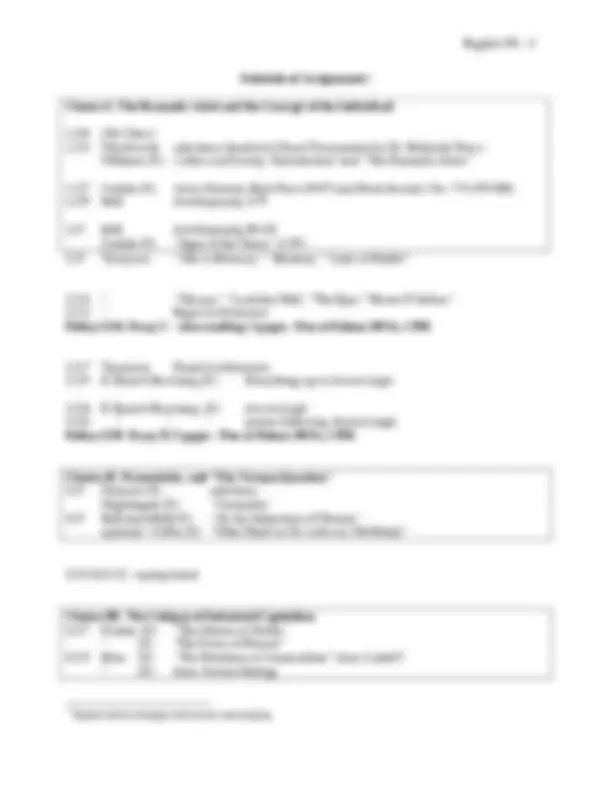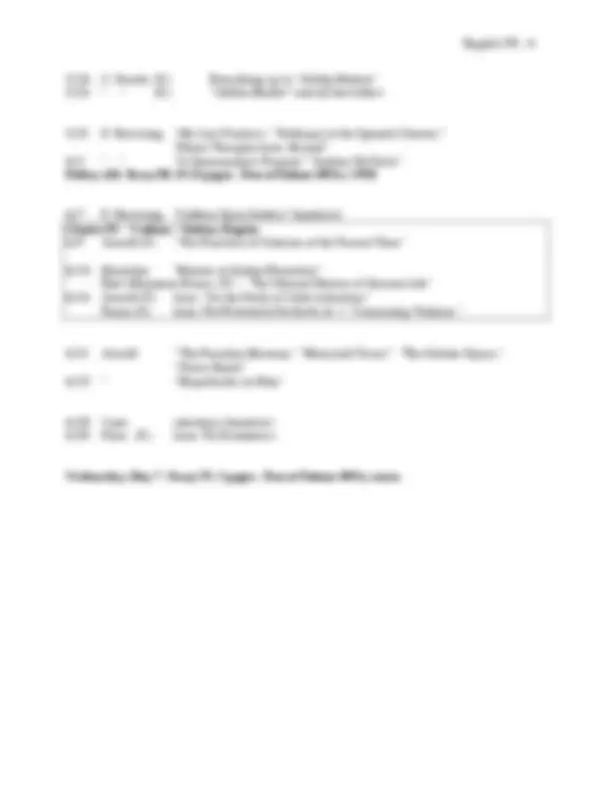




Study with the several resources on Docsity

Earn points by helping other students or get them with a premium plan


Prepare for your exams
Study with the several resources on Docsity

Earn points to download
Earn points by helping other students or get them with a premium plan
Community
Ask the community for help and clear up your study doubts
Discover the best universities in your country according to Docsity users
Free resources
Download our free guides on studying techniques, anxiety management strategies, and thesis advice from Docsity tutors
Material Type: Exam; Class: ADVANCED POETRY TUTORIAL; Subject: English; University: Rhodes College; Term: Spring 2000;
Typology: Exams
1 / 4

This page cannot be seen from the preview
Don't miss anything!



English 351, Spring 2003 Professor Bigelow MW 3:00-4:30 Palmer 208 bigelow@rhodes.edu Off. Hrs. TTH 11:20-12-50 & by appt. H: 728- Off: Palmer 310, x
Victorian Poetry and Prose
Every period in European history or the history of the Americas can be said in some way to be a direct ancestor of our own. But while every period can make some claim of this kind, the nineteenth century can in a more powerful and far-reaching way be seen as the creator of the present. The pervasive influence of the industrial system of production and relatively rapid global transport, the economy of commodities and consumers it created, the instability of social systems based on such an economy—all these elements of life in the twenty-first century were new in the period 1837-1901, Victoria’s reign and the period we consider in this course.
In response to and alongside huge changes in the shape of human life, nineteenth century people invented ways of coping, ways of thinking about themselves and other people, that helped things make a tiny bit of sense. These strategies for coping with modernity (a good word for summing up the weirdness of what was new in the nineteenth century) include a different sense of “the self,” of human subjectivity; a changing set of ideas about gender and sexuality; a set of positions—for and against—the new industrial economy; a set of positions about global relations, about England’s “identity” as a nation and the meaning of its conquest of a worldwide chain of colonies. These concepts and strategies, in many ways, still form the foundation of the dominant cultures in Europe and the U.S. I don’t mean that everyone believes now the same things people believed 150 years ago. There’s rarely any one unified “Victorian” belief on a given issue anyway. Rather, we inherited assumptions, concepts, norms, which are the tools of contemporary action and analysis.
Concepts and strategies like these aren’t created overnight; they emerge with a kind of geologic slowness, layer on layer, out of all manner of cultural discourse: journalism, professional and academic writing, political reportage, and literature. To highlight particularly sensitive ideas in British cultures in this era, I’ve grouped prose texts into four clusters, each considering a particular topic. Around these clusters, we will survey the work of 5 poets. Not every issue in the prose clusters will illuminate every poem we read, but the context of these prose readings will help us see how poems speak to, respond to, create, or theorize common, everyday questions in different form.
Course Texts: William E. Buckler, ed. - The Major Victorian Poets: Tennyson, Browning, Arnold John Stuart Mill – Autobiography A rather large course reader, available at the bookstore
Course Requirements: Readings: To prepare readings for class, whether prose selections or poetry, make some note of passages or ideas or formal features that you’re interested in or have questions about. It's your responsibility to raise questions you're interested in, and to direct our discussion to issues you feel are important.
Papers: All written work must be typed or printed, double-spaced with standard margins, grammatically correct and carefully proofread. I will provide a range of topics for papers, but I will encourage you to write about the ideas that you care most about, if necessary at the expense of my suggested topics. When grading your essays, I will be looking most centrally for your ability to provide detailed and thoughtful close readings of quoted passages--both long and short--from the texts you're writing about. If the concept of close reading is unfamiliar to you, don't worry; we'll spend a good deal of time on this in class. Secondly, I'll want to see that you can link a number of individual quoted passages together, using your readings as evidence to support a single overall argument. As I move between individual paragraphs in your essay, I'll look for connections between each piece of quoted evidence and a developing emphasis on your overall argument. These are very general guidelines; I will provide a handout on standards for excellent critical essays, and a specific handout on standards for the research paper you will write in the second half of the course. If you have specific questions I urge you to raise them in class or in office hours. I encourage you to bring ideas or drafts to office hours if that would be useful for you. Late Papers will be marked down one third of a grade per day; e.g. an A paper would receive an A- if one day late, a B+ if two days late, etc.
Presentations: I’ll be asking each of you to choose one reading and make a 5-10 minute presentation on it in class. I will discuss the guidelines for these presentations in the next few weeks.
Grades will be figured as follows: Essay I 10% Essay II 20% Essay III 35% Essay IV 25% Presentation and other work in class 10%
Absences: You may miss up to 3 classes without excuse or penalty. More than three absences will affect your overall grade, and further absences will be considered grounds for failing the course.
Final Note: I reserve the right to schedule reading quizzes and/or a final exam for this course if it seems like people aren’t doing the reading.
3/24 C. Rosetti (R) Everything up to “Goblin Market” 3/26 “ “ (R) “Goblin Market” and all that follow
3/31 R. Browning “My Last Duchess,” "Soliloquy of the Spanish Cloister," "Home Thoughts from Abroad" 4/2 “ “ "A Grammarian's Funeral," "Andrea Del Sarto” Friday, 4/4: Essay III, 12-15 pages. Due at Palmer 305 by 3 PM
4/7 R. Browning "Caliban Upon Setebos" (handout) Cluster IV: “Culture,” Nation, Empire 4/9 Arnold (R) “The Function of Criticism at the Present Time”
4/14 Macaulay "Minute on Indian Education" Eliot (Marianne Evans) (R) “The Natural History of German Life” 4/16 Arnold (R) from “On the Study of Celtic Literature” Fanon (R) from The Wretched of the Earth , ch. 1 “Concerning Violence,”
4/21 Arnold “The Forsaken Merman,” "Memorial Verses" "The Scholar Gypsy,” “Dover Beach” 4/23 “ “Empedocles on Etna”
4/28 Yeats selections (handout) 4/30 Pater (R) from The Renaissance
Wednesday, May 7: Essay IV, 5 pages. Due at Palmer 305 by noon.